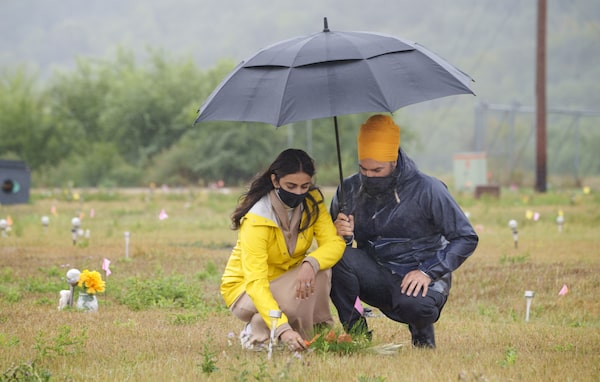
NDP Leader Jagmeet Singh and his wife, Gurkiran Kaur Sidhu, place flowers on a grave where 751 bodies were buried on the grounds of the Marieval Indian Residential School on Cowessess First Nation, Sask., on Aug. 20, 2021.Paul Chiasson/The Canadian Press
NDP Leader Jagmeet Singh said Friday that he wanted to draw more attention to the issue of unmarked burial sites at former residential schools, and that the issue has fallen out of the national dialogue.
Indigenous communities have lived with the legacy of residential schools for decades and survivors have long said there were children who never came home, Mr. Singh said Friday during a visit to Cowessess First Nation in Saskatchewan.
In May, a B.C. First Nation, Tk’emlúps te Secwépemc, announced preliminary findings of a search using ground-penetrating radar that uncovered remains of children at the former Kamloops Indian Residential School. The news touched off vigils and commemorations and demands for Ottawa to take further action. Other communities made announcements about unmarked graves as well.
When the country first learned of the discovery at Kamloops, people were heartbroken, the NDP Leader said, but now individuals have started to look away.
Ottawa commits $321-million to search for residential school graves, help survivors
“People stopped realizing this is a painful and ongoing legacy,” he said. “I wanted to use the platform that I have to say ‘We can’t look away. We can’t look away from these kids. We can’t look away from this trauma. We have a responsibility to fight for justice.’ ”
In June, Cowessess First Nation Chief Cadmus Delorme announced that 751 unmarked graves were discovered in the Roman Catholic cemetery at the site of the former Marieval Indian Residential School. He said the gravesite is locally believed to include the bodies of both children and adults.
Further action is required to address the matter, Mr. Singh said. He added that many had hoped Mr. Trudeau would do more on the issue of reconciliation in government, including on eliminating all drinking-water advisories for First Nations, as promised, and holding people responsible for crimes at residential schools.
“A country killed its own people,” he said. “It is about Indigenous people being denied justice, being denied dignity.”
On the issue of reconciliation, Conservative Leader Erin O’Toole, who was in Winnipeg, said it is an issue that is important to him and the Conservative caucus.
He said he has previously met with Mr. Delorme. “I admire his leadership,” he said, citing Mr. Delorme’s work on child welfare and healing. “Mr. Trudeau, I know, cares, but he never acts. With a Conservative government, we will have more than just words.”
Last week, before the election campaign began, the federal government announced $321-million in additional support for Indigenous-led initiatives it said would be focused on survivors and helping Indigenous communities respond to and heal from the continuing impact of residential schools.
Ottawa said that of this funding, $83-million would supplement spending for community-led processes to research and locate burial sites and to commemorate and memorialize the children who died at residential schools. The government said this money was in addition to $27.1-million that was committed in the 2019 budget.
Mr. Trudeau, also in Winnipeg, said the Liberal government demonstrated its partnership with communities across the country, including to discover remains and to honour the children who did not come home. He also said they have looked at seeking accountability “in every possible way” and the Justice Minister had been engaged with stakeholders to make sure Ottawa is doing everything necessary.
The NDP has called for the appointment of a special prosecutor to probe crimes against Indigenous students who attended the schools.
It is not a political decision to lay charges but rather that is done by independent officials in a responsible way, Mr. Trudeau said Friday.
In a June interview with The Globe and Mail, former Truth and Reconciliation Commission (TRC) chair Murray Sinclair said an independent investigation should be conducted to “determine whether crimes occurred – not only in terms of the cause of death, but whether crimes occurred in terms of coverups.”
The TRC wasn’t empowered to go through the government’s archives with a subpoena, Mr. Sinclair said, adding that this was also the case for church records.
Three Indigenous leaders in Manitoba were at Mr. Trudeau’s event in Winnipeg. They expressed concern that Indigenous issues had received very little attention during the first week of the campaign.
Arlen Dumas, Grand Chief of the Assembly of Manitoba Chiefs; Cindy Woodhouse, the Manitoba regional chief of the Assembly of First Nations; and Manitoba Keewatinowi Okimakanak Grand Chief Garrison Settee all met with the Liberal Leader on his campaign bus.
Prior to a discussion with Mr. Trudeau, the chiefs told reporters that the Liberal government took some positive steps to address the fallout from the discovery of unmarked graves and to provide money to find others.
But they said more needs to be done, including to provide mental-health supports for survivors and descendants and to ensure Canadians learn the truth of what happened at the schools, which operated for more than 120 years.
“Without truth, there is no reconciliation,” Mr. Settee said. “Canadians have to see what that truth is before there can be any reconciliation and the time for reconciliation is now.”
The number for the National Indian Residential School Crisis Line is 1-866-925-4419. British Columbia has a First Nations and Indigenous Crisis Line offered through the KUU-US Crisis Line Society, toll-free at 1-800-588-8717.
Know what is happening in the halls of power with the day’s top political headlines and commentary as selected by Globe editors (subscribers only). Sign up today.